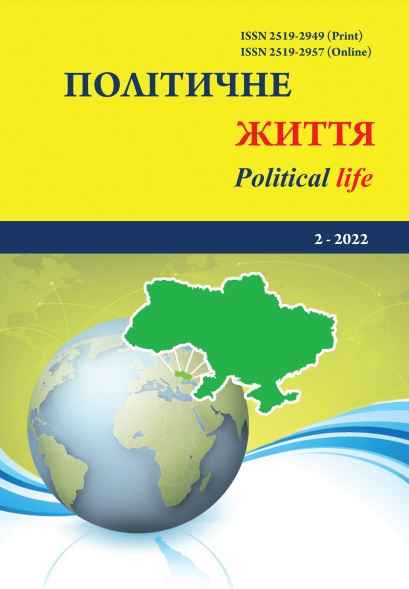War in Ukraine through the Prism of Political Subjectlessness
DOI:
https://doi.org/10.31558/2519-2949.2022.2.4Keywords:
war in Ukraine; subjectlessness of politics; political system; neo-imperialismAbstract
As part of scholarly reflection on the full-scale war in Ukraine, the article presents a retrospective review of trends in Russia’s political system development compared to Ukraine over the past decade from the perspective of political subjectlessness. The author suggests that the consensus of the "silent majority" in Russian elites and society formed at the beginning of the war is caused by the fact that the aggressive attack on Ukraine was a pattern stage in the development of the Russian political system within a new phase of the neo-imperial cycle. Based on the synergetic paradigm, the article reveals the notion of political subjectlessness and the principle of resonance influences. The managing impact on the development processes of a nonlinear system can only be effective when it is consistent with the internal properties of that system. According to the author’s findings, both political systems at the time of war are inherently subjectless: the political actions of the actors correspond to the internal state of the systems, which has been formed in the course of previous practices. Thus, as the empirical evidence proves, trends over the last decade in Russia suggest that the consolidation of V.Putin’s personalist authoritarian regime has taken place in parallel with the growth of paternalism, public passivity and the destruction of horizontal ties. On the other hand, Ukrainian President V.Zelenskiy meets the demand of the network decentralised Ukrainian political system for a wartime leader. Provided that the formation of a new imperial cycle in contemporary Russia is a subjectless process, even if the scenario of a dictator change happens, the political system will continue to develop within this cycle. Given the short duration of aggressive imperial projects of the 20th century, despite certain subjective efforts of the Kremlin regime, the aggressive full-scale war against Ukraine may well lead to the beginning of the decline stage in the life cycle of neo-imperial project for Russia.
References
Levada Center Indicators. URL: https://www.levada.ru/en/ratings/ (дата звернення: 08.05.2022).
Десяте загальнонаціональне опитування: ідеологічні маркери війни (27 квітня 2022). Група «Рейтинг». URL: https://ratinggroup.ua/research/ukraine/desyatyy_obschenacionalnyy_opros_ideologicheskie_markery_voyny_ 27_aprelya_2022.html (дата звернення: 08.05.2022).
World Values Survey Wave 7 (2017 – 2021). URL: https://www.worldvaluessurvey.org/WVSContents.jsp (дата звернення: 08.05.2022).
Nations in Transit 2021: The Antidemocratic Turn. Freedom House. URL: https://freedomhouse.org/report/nations-transit/2021/antidemocratic-turn (дата звернення: 08.05.2022).
The Legatum Prosperity Index 2021. Legatum Institute Foundation. URL: https://www.prosperity.com/download_file/view_inline/4429 (дата звернення: 08.05.2022).
Краснякова А.О. Політична суб’єктність: умови становлення та ознаки розвитку. Проблеми політичної психології. 2014. № 1. С. 45-55.
Злобіна О.Г. Особистість як суб’єкт соціальних змін. К.: Інститут соціології НАН України, 2004. 400 с.
Хакен Г. Синергетика. Пер. с англ. В.И. Емельянов. М.: Мир, 1980. 388 с. 9. Гелих О.Я., Князева Е.Н. Управление и синергетика: учебное пособие / 3-е изд. СПб.: Книжный Дом, 2012. 217 с.
Пантин В.И. Циклы и волны глобальной истории. Глобализация в историческом измерении. М., 2003, 276 с.
Tilly Ch. After empire: multiethnic societies and nation-building. The Soviet Union, and the Russian, Ottoman and Habsburg empires / Barkey K., von Hagen M. (eds.). Boulder; Oxford: Westview press, 1997. 211 p.
Ferguson N. Empires with expiration dates, Foreign Policy (September/October 2006), pp. 46-52. URL: https://foreignpolicy.com/2009/10/14/empires-with-expiration-dates/ (дата звернення: 08.05.2022).
Motyl A. Why Empires Reemerge: Imperial Collapse and Imperial Revival in Comparative Perspective. Comparative Politics. 1999.Vol. 31, No. 2, pp. 127-145. DOI: https://doi.org/10.2307/422141
Прощайте, 2010-е: как граждан России лишили участия в политической жизни. The Bell. URL: https://thebell.io/proshhajte-2010-e-kak-grazhdan-rossii-lishili-uchastiya-v-politicheskoj-zhizni (дата звернення: 08.05.2022).
Балакірєва О.М., Дмитрук Д.А. Динаміка громадської активності та рівня довіри в Україні. Ukr. Socìum. 2020. № 1(72). С.162 – 185. DOI: https://doi.org/10.15407/socium2020.01.162
Putnam R. D. Bowling Alone: America’s Declining Social Capital. Journal of Democracy. 1995. № 6 (1), P. 65-78. DOI: https://doi.org/10.1353/jod.1995.0002
Sztompka P. Trust: A Sociological Theory. Cambridge University Press, 1999. 214 pp.
Мирясова О. А. Гражданская субъектность как предпосылка формирования политического поля. Политическая наука. 2018. № 2. С. 214-233.
Newton, K., Zmerli, S. Three forms of trust and their association. European Political Science Review. 2011. № 3(2), Р. 169-200. DOI: https://doi.org/10.1017/S1755773910000330

